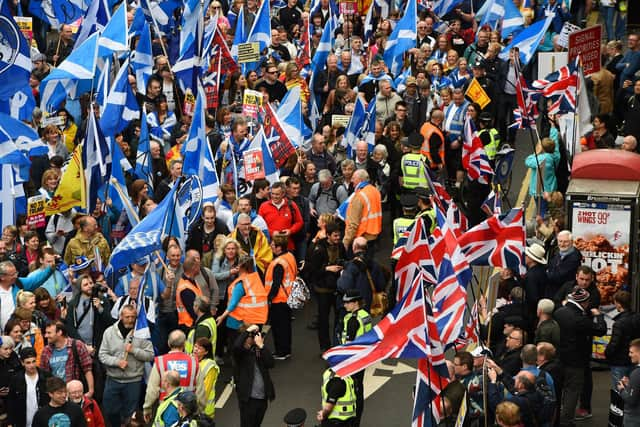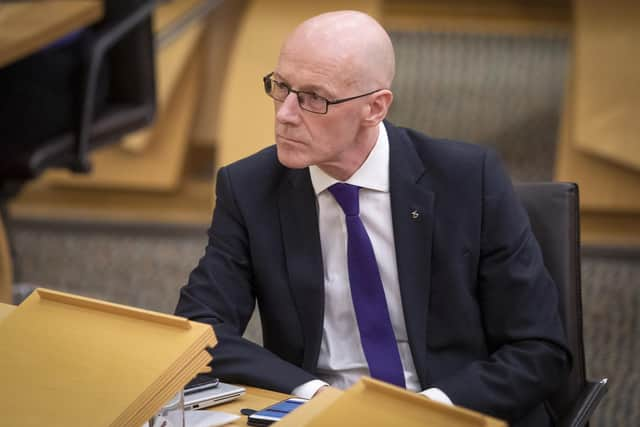GERS figures: Scottish Government faces mounting pressure over whether oil and gas will be part of economic case for Scottish independence
This article contains affiliate links. We may earn a small commission on items purchased through this article, but that does not affect our editorial judgement.
It came as Deputy First Minister John Swinney refused to confirm whether the Scottish Government would rely on a continuing oil price spike in their renewed prospectus for independence.
Without oil and gas revenue included, the Scottish deficit would have shrunk at the same rate as the whole of the UK, underlining the importance of the sector to Scotland’s tax revenue.
Advertisement
Hide AdAdvertisement
Hide AdThe acting finance secretary also argued the improved notional deficit demonstrated how an independent Scotland could make successful use of fiscal powers.
Anti-independence critics said the new Government Expenditure and Revenue Scotland (GERS) figures demonstrated the benefit of being part of the Union and the scale of the challenge that would face a newly independent Scotland.
GERS figures state the notional deficit – the difference between revenue raised in Scotland and public sector spending – has fallen by 10.3 percentage points to 12.3 per cent compared to a record high of 22.7 per cent last year.
It now sits at £23.8 billion, rising to £27.1bn when North Sea oil and gas is excluded.


Mr Swinney claimed this meant Scotland’s notional deficit dropped faster than for the UK, which has fallen by 8.4 percentage points. However, Scotland’s figure is identical to the UK’s once revenues from North Sea oil and gas are excluded.
Mr Swinney said the figures demonstrated Scotland was “recovering faster than the UK” and the record revenue – up £11.8bn to £73.8bn – was enough to cover “all day-to-day devolved spending”.
However, the UK’s deficit has reduced in size by 57.9 per cent, compared to Scotland’s 45.8 per cent fall, suggesting the UK deficit has dropped faster in terms of size.
The notional deficit is also twice the size of the UK’s, improving on the position pre-pandemic when it was four times the size.


Advertisement
Hide AdAdvertisement
Hide AdThe so-called ‘union dividend’, calculated by comparing the difference in expenditure per person and revenue per person between the UK and Scotland, sits at £2,184.
Last year’s revised figures suggest this has risen by more than £200 from £1,925.
Total public expenditure in Scotland during 2021/22, covering both Scottish and UK government spending and the rest of the public sector, was £97.5bn.
This is equivalent to 9.2 per cent of total UK public sector expenditure, or £17,793 per person.
On what the figures mean for independence and responding to claims they demonstrate the benefits of the Union, Mr Swinney said: “I think people will see that the economic prospects in the UK are not positive in the future.
"As a consequence, people can look to what an independent Scotland, with an improving set of public finances in the devolved context, could utilise the fiscal responsibilities and flexibilities that are available to create the type of prosperity that people want to see.”
He refused to confirm whether the coming economic prospectus for independence would rely on the likely excellent figures from next year’s GERS, in which oil and gas revenue is expected to increase in quality.
Mr Swinney also refused to say whether the Government would follow the Sustainable Growth Commission’s recommendation of leaving aside oil and gas revenues when making the case for an independent Scotland.
Advertisement
Hide AdAdvertisement
Hide AdAt least five more independence papers are expected from the Scottish Government in coming months.
Asked whether the influence of the oil and gas figures demonstrate the volatility of the Scottish economy being based on the North Sea, the Deputy First Minister dodged the question.
"We have a strong sector,” he said.
“It is contributing formidably towards the public finances of Scotland and the UK to an increasing extent and you’ll see that even more during this current financial year.
"But obviously there is a period of adaptation that we have got to undertake to ensure that we develop the whole approach to the net zero transition, which enables the oil and gas sector to contribute towards that process.”
Scottish Conservative finance spokesperson Liz Smith said the figures demonstrated the strength of the being part of the union, in particular the £2,184 of the so-called ‘union dividend’.
She said: “Scotland is £12bn better off as part of the United Kingdom. Instead of using time and resources to divide us, the SNP should take these figures as a wake-up call and start working with the UK Government to deliver for the real priorities of Scotland.
“These figures demonstrate clearly that pushing for another referendum is the wrong priority when we need the whole United Kingdom working together to get through the current economic crisis.
"They are a devastating blow to Nicola Sturgeon's indyref2 bid."
Advertisement
Hide AdAdvertisement
Hide AdScottish Labour’s finance spokesperson Daniel Johnson said it was “reckless and dangerous” for the SNP to put their “constitutional obsession” ahead of the economic security of the public.
He said: “The focus of every politician in Scotland must be on tackling the cost-of-living crisis and today's GERS statistics plainly show how the people of Scotland benefit financially from our United Kingdom.
“The figures confirm, yet again, that Scotland has an increased level of public spend relative to its tax base. That gives fiscal room that is vitally needed as we tackle the cost-of-living crisis.
"Independence would require tax increases or spending cuts at a time when these actions would shatter households as their bills spiral.”
Scottish Liberal Democrat finance spokesperson John Ferry added: “SNP parliamentarians have been keen to dismiss the GERS numbers when they don’t suit their separation agenda, but we must face the reality that they demonstrate the real economic costs of cutting ourselves off from our existing wider tax base.”
Alister Jack, the Scottish Secretary, said the figures demonstrated how people in Scotland benefit from being part of the UK.
He said: "Scotland's deficit – the shortfall between taxes raised here, including oil, and public spending – stands at £23.7bn. But as part of the UK, we can rely on the Treasury to step up to support us in plugging the gap.
"At a time of unprecedented challenges, sharing resources around the UK has never been more important.
Advertisement
Hide AdAdvertisement
Hide Ad"As we continue to recover from the pandemic and confront global pressures on prices and the cost of living, it is clear we need a shared and a relentless focus on boosting the economy."
The fifth episode of the brand new limited series podcast, How to be an independent country: Scotland’s Choices, is out now.
It is available wherever you get your podcasts, including Apple Podcasts and Spotify.
Comments
Want to join the conversation? Please or to comment on this article.

